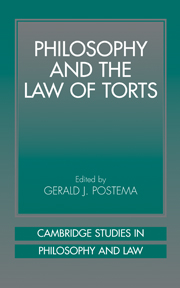Book contents
- Frontmatter
- Contents
- Contributors
- 1 Introduction: Search for an Explanatory Theory of Torts
- 2 A Social Contract Conception of the Tort Law of Accidents
- 3 Responsibility for Outcomes, Risk, and the Law of Torts
- 4 The Significance of Doing and Suffering
- 5 Tort Law and Tort Theory: Preliminary Reflections on Method
- 6 Corrective Justice in an Age of Mass Torts
- 7 Economics, Moral Philosophy, and the Positive Analysis of Tort Law
- 8 Pluralism in Tort and Accident Law: Towards a Reasonable Accommodation
- References
- Index
2 - A Social Contract Conception of the Tort Law of Accidents
Published online by Cambridge University Press: 01 July 2009
- Frontmatter
- Contents
- Contributors
- 1 Introduction: Search for an Explanatory Theory of Torts
- 2 A Social Contract Conception of the Tort Law of Accidents
- 3 Responsibility for Outcomes, Risk, and the Law of Torts
- 4 The Significance of Doing and Suffering
- 5 Tort Law and Tort Theory: Preliminary Reflections on Method
- 6 Corrective Justice in an Age of Mass Torts
- 7 Economics, Moral Philosophy, and the Positive Analysis of Tort Law
- 8 Pluralism in Tort and Accident Law: Towards a Reasonable Accommodation
- References
- Index
Summary
Competing conceptions of the law of accidents take fundamentally different views of its task. Economic conceptions of the subject suppose that accident law should promote the general welfare, conceived as the satisfaction of people's preferences for their own well-being, and counted as wealth. Wealth – willingness to pay – measures welfare. The price that prospective victims will pay for risk-reducing precautions reveals the intensity of their preferences for safety, just as the price that prospective injurers will pay for the right to forego such precautions reveals the intensity of their preferences for imposing risk. By reducing risks until a dollar more spent on prevention yields less than a dollar's worth of increased safety, cost-minimizing liability rules maximize both the wealth and the welfare generated by accident producing activities (Cooter and Ulen 1988). Indeed, even when wealth and intensity of preference are imperfectly aligned, the maximization of wealth figures in the maximization of well-being; imperfections in the congruence between wealth and welfare are best cured by maximizing wealth in accident law and redistributing it through tax law (Kaplow and Shavell 1994).
Libertarian conceptions of the subject start from an apparently opposite premise – from the conviction that the law of accidents should protect individual rights, not promote the general welfare. They suppose that we each have a natural right to the integrity and inviolability of our persons, and that this right entitles us to be free of injuries inflicted by others.
- Type
- Chapter
- Information
- Philosophy and the Law of Torts , pp. 22 - 71Publisher: Cambridge University PressPrint publication year: 2001
- 13
- Cited by

